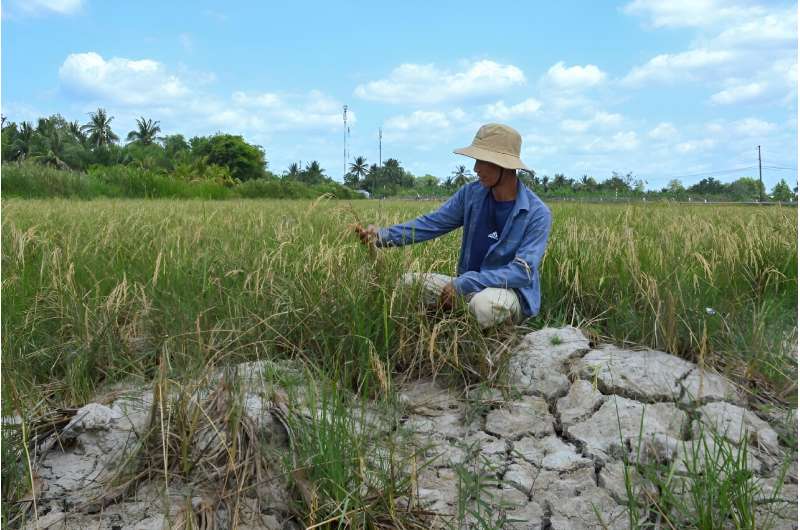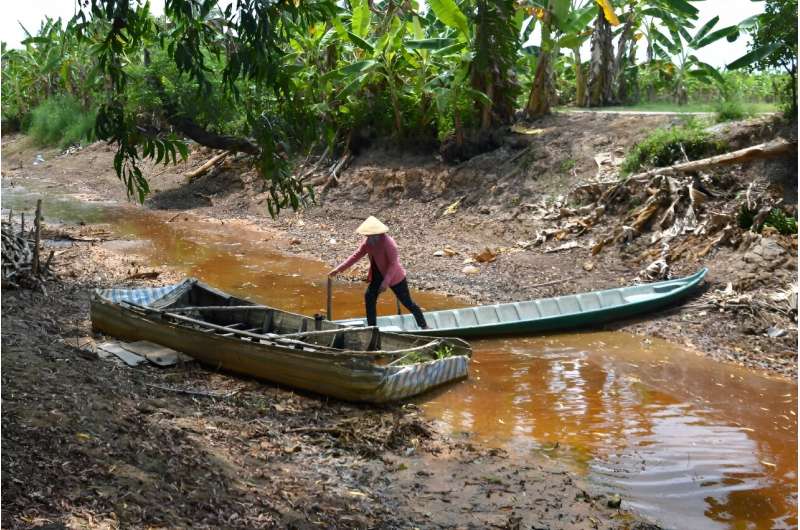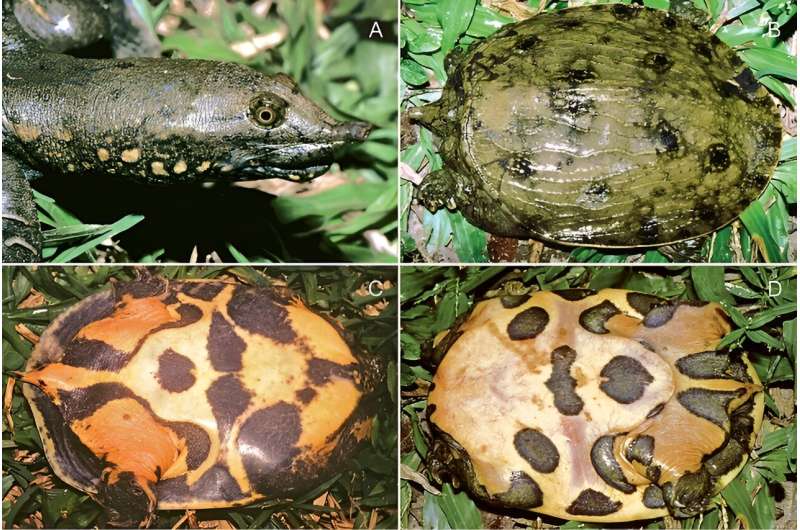Vietnam's 'rice bowl' cracks in monster heat wave

Southern Vietnam, including business hub Ho Chi Minh City and its "rice bowl" Mekong Delta region, suffered an unusually long heat wave in February, weather officials said Wednesday.
Several areas of the delta are also suffering drought and farmers are struggling to transport their crops due to low water levels in the region's canals.
The intense period of heat began on February 9, meteorologists told AFP, with temperatures reaching up to 38 degrees Celsius (100 degrees Fahrenheit)—an "abnormal" high for February in southern Vietnam, which usually sees hot weather peak at around 39C (102F) in April or May.
In Ca Mau province, at the tip of the Mekong Delta, farmer Hong Chi Hieu told AFP that "severe drought" had made the earth "very, very dry" and caused problems using the waterways.
"Most of us grow rice here. We have quite a bumper crop this year but the dry canals are badly impacting the transportation of our harvest," he said.
Le Dinh Quyet, chief forecaster at the Southern Meteorological and Hydrological Administration, said the El Niño weather phenomenon and the general impact of global climate change were contributing to the unusually long dry spell, which is still going on.
Globally, 2023 was the warmest year on record, according to the World Meteorological Organization (WMO).

It warned last month that this year could be even hotter because the naturally occurring El Niño climate pattern, which emerged in mid-2023, usually increases global temperatures for one year afterwards.
Scientists have warned extreme weather is also being intensified by global warming.
More than 80 canals have dried up in the Tran Van Thoi district of Ca Mau province, state-controlled news site VNExpress reported.
According to local authorities, agricultural production is entirely reliant on rainwater and, given its scarcity this year, farmers were forced to pump water from waterways into their fields.
That caused a large height difference between the riverside road surface and the water level below, leading to subsidence and landslides, local authorities said, according to VNExpress.
Tran Van Thoi has recorded around 340 cases of subsidence and landslides from the beginning of the year, resulting in more than 13 billion VND ($500,000) of damage.
© 2024 AFP
El Nino brings hunger, drought fears to Madagascar
Breeding programs initiated in Vietnam to help turtle species threatened by extinction

Considered a delicacy in China and Vietnam, the spotted softshell turtle faces threats from overconsumption and habitat loss. Conservationists have initiated breeding programs in Vietnam to recover spotted softshell turtle populations.
Based on a literature study, field surveys across Vietnam, and genetic screenings of collected samples, researchers estimated the range and conservation status of Pelodiscus variegatus, the spotted softshell turtle. The data were then used to model the species' potential range in Vietnam. The study is published in Nature Conservation.
Alarmingly, although several protected areas in Vietnam appear to harbor suitable habitats for the species, no populations were identified in any of the sites, indicating it is especially susceptible to extinction.
To recover natural populations of the species, the Institute of Ecology and Biological Resources and Cologne Zoo, Germany, initiated an in-country breeding program. In late 2023, they released 50 young and healthy turtles to a site with suitable climate and habitat in northern Vietnam.
It is hoped that additional individuals will be reintroduced to protected areas in north-central Vietnam, the sanctuary of spotted softshell turtles, to reverse its declining trend and further contribute to the global Reverse the Red movement, a target best accomplished by applying the IUCN's One Plan Approach to Conservation.
Softshell turtles of the genus Pelodiscus are broadly distributed from southeastern Siberia through China to Vietnam. However, their range is currently extended to Indonesia, northern Australia, western Europe, North America, Hawaii, and Mauritius as a result of human transportation and breeding activities.
The turtles are considered a delicacy in China and some Southeast Asian countries. In China alone, each year hundreds of millions of turtles are traded, making them the most widely consumed turtles in the world.
Traditionally, this genus had been considered monotypic with only one recognized species, the Chinese softshell turtle (Pelodiscus sinensis). However, recent research has shown that the genus is much more diverse with at least seven species known to science.
Due to their morphological similarity, widespread farming activities, overharvesting, and their aquatic lifestyle, it is often difficult to study them in their natural habitat to better understand their distribution as well as their population and conservation status.
The spotted softshell turtle is facing tremendous threats, from habitat loss to overharvesting for food and genetic pollution because the Chinese softshell turtle has been farmed across the country, imperiling the native genetic sources.
As a result, the Turtle Taxonomy Working Group, the global authority on taxonomic and conservation status of turtles worldwide, provisionally classifies the species as Critically Endangered, the highest ranking for taxa most vulnerable to extinction.
More information: Minh Duc Le et al, Climatic niche modelling and genetic analyses highlight conservation priorities for the Spotted Softshell Turtle (Pelodiscus variegatus), Nature Conservation (2024). DOI: 10.3897/natureconservation.55.114746
Journal information: Nature Conservation
Provided by Pensoft Publishers
No comments:
Post a Comment